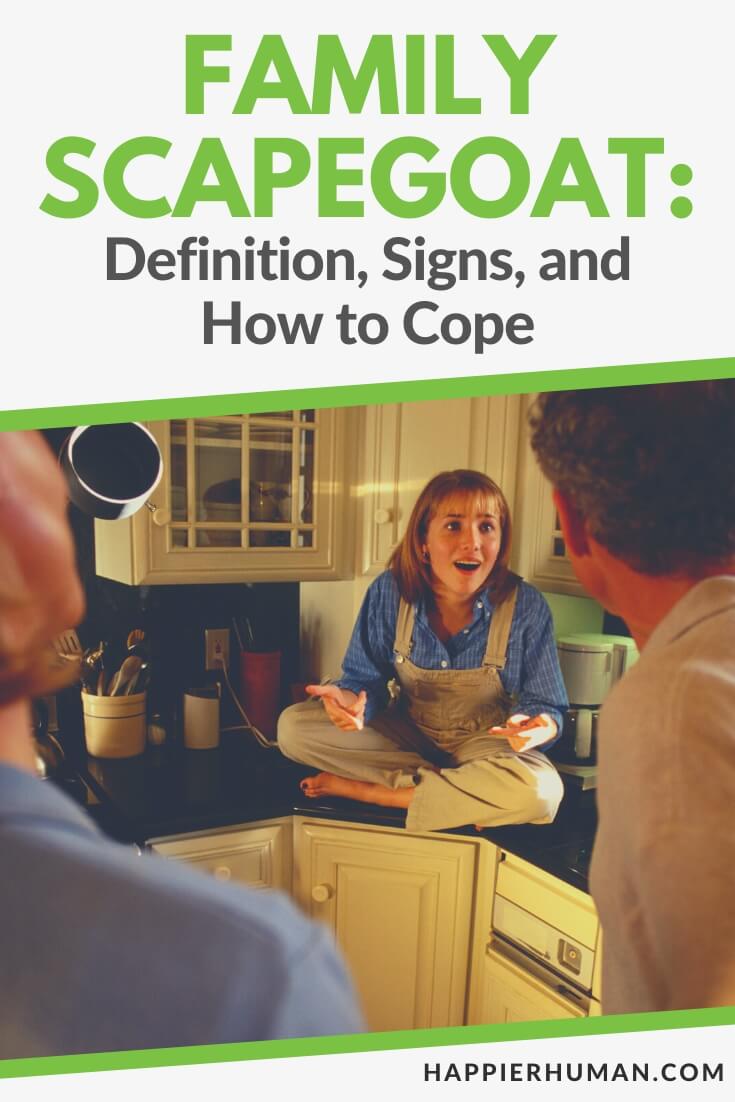Have you ever felt like whatever goes wrong in your family’s always your fault? Being the family scapegoat isn’t easy, and it can really affect your path in life.
Being constantly blamed for things that usually aren’t even your fault is damaging to your self-esteem, health, and mental well-being.
My father was the family scapegoat in his family when he was a child. The result of this is that he’s always struggled with feeling accepted, good enough, or loved enough.
He’s constantly trying to fit in, and while he wants to have friends, he shies away from people because he’s used to being accused of stuff he didn’t do by the people in his life.
Like a goat that’s been tied to a tree for slaughter and sacrifice, the family scapegoat struggles to free themselves, never trusts the people who accused them, and fears being led to slaughter again.
Are you the sin-eater or scapegoat in your family? Let’s look at the meaning of being the blame-carrier, the signs of it, and help you work on how to get over the trauma of being your family’s punishment post.
What Is a Family Scapegoat?
Like the sin-eater, the family scapegoat carries all the sins, shame, and blame of their family. They are singled out as always being the one who transgresses, disappoints others, and fails the family – no matter how hard they try.
A family scapegoat can be any family member, and even a close family friend, as long as they are convenient to carry the blame of the rest of the family unit. Being the family punishment post is painful, causes feelings of isolation, and can scar you for life.
In some families, this can be taken way too far. I recall a friend of my brother who was the scapegoat in his family. He was blamed for everything. When his younger twin sisters fell on the lawn, his father would belt him because they cried.
Needless to say, he developed a deep resentment of his father, and later in life, he chose to cut all ties to his father.
One has to wonder just why people make a scapegoat out of one person in the family. The simple answer is that it’s always easier to blame someone else than to shoulder your own responsibility when you mess up.
The American Psychological Association classifies scapegoating as the process when people direct their anger, fear, and negativity toward one specific person in the family. This person then becomes the source of everyone’s anger and negativity.
How the Scapegoat Gets Chosen
It’s not like you get born into the family with the expressed assignment of being the scapegoat, so how do families choose who to bully and where to lay their blame?
There are a few elements that make families select their scapegoat. (Of course, they often do so subconsciously.)
Inferior intelligence
If you are not as intellectually endowed as the rest of the family, they may see you as weaker, therefore easier to bully.
Physically different
We are biologically geared to notice differences, which often cause us to target those who are different. If you’re not as beautiful as your siblings, you’re almost guaranteed to be the scapegoat.
Illness or injury
Families may rally around a family member who is ill, but they may also gang up on them and ostracize that person as being weaker, and therefore, offload all their blame and shame onto them.
Previously shameful behavior
Should you have a history of messing up, you may end up with the rest of the family’s shame on your shoulders too.
Opportunity and luck
Perhaps you just have bad luck and end up as the scapegoat because you were in the wrong place at the wrong time. You were there when a popular family member messed up, so you were blamed, and it snowballs from there.
Where Does the Expression “You’re the Family Scapegoat” Come From?
The scapegoat is a biblical construct, where a goat is chased into the wild, carrying the sins of the community or family.
Usually, the laying up of these sins was the task of the priest, but in today’s family, it may be the alpha in the family who does this. The book of Leviticus records how the goat became a symbol of sacrifice, carrying the collective sins of the family with them.
The goat is cast aside. It’s expected of them to move away, perish, or get lost in the wilds with their sin-burden. The scapegoat is conditioned to act as a sacrifice for the sins of others, which leaves them destitute in the wilds outside the family.
The prejudice of the family helps alleviate their anger and frustration by laying the blame for whatever’s wrong on the scapegoat.
7 Signs you’re the Family Scapegoat
Seeing the signs that you are being victimized and targeted by your family or community helps you guard against the scapegoat.
Here are the main signs that you are your family’s scapegoat:
1. You’re the Punching Bag
Do you always feel like you’re the object of their frustration? Your family constantly “lets you have it.”
Whether they’re actually angry at you or just making fun of you, the “joke” is always on you. They always act in a way that ends up costing you.
Sadly, friends of the family may join in, not understanding that name-calling and assigning blame is not a weird way that your family “loves you.” Your family even tells others how “weak and useless you are.”

It’s like they feel obligated to warn others of your “ineptitude” and, therefore, you always feel like you’re on guard when you meet people.
Naturally, you’ve developed a sense of shame, self-loathing, and brewing violence. At some point, you will snap, lashing out at others because they’ve been doing it to you all along.
Your family members are behaving in a narcissistic way, which means the lower they can push you, the better they feel about themselves.
2. You Come Last
If you’ve ever felt like what you want in life doesn’t matter, it’s likely a sign you are the family scapegoat.
Since you’re always made fun of and have become the repository (or should it be suppository?) of the family’s frustration and negativity, you may even have given up on your own dreams.
On the rare occasion you do stand up for your dreams and get to showcase your talent, they quickly cut you back down to their size.
They’ll deliver compliments with a sting in the tail, or just plain tell you that you should give up on that dream since you’re useless. As long as you are working on what they want, they will leave you alone.
However, your abusive family is quick to run to you when they need help. You are the fixer, the bearer of their anger, but also the one who is plan F to them.
Should you need their help, you’re more likely to get blood from a stone than actually be supported by them.
If you actually speak up and tell them how they have failed you, they are quick to justify their actions and trivialize the abuse you’ve been dealt.
3. Becoming Invisible
When they don’t currently need you to carry their shame and failures, they leave you alone. In fact, they simply ignore you. It’s like you’re invisible until you’re needed to carry blame or help them out of a bind.
Truthfully, you’re just a dust pan, which is hidden in the broom closet until you’re needed to clean up a mess or carry the waste. Where others in your family are always the center of attention, you are always ignored in conversations, or they simply talk over you.
Perhaps you’ve a habit of speaking the truth or raising issues that the family would rather keep hidden (or blame on you), which is why they ignore you, hoping you’ll go away.
4. You Are Held Responsible
I recall a story of a guy who was always told he had broken the neighbor’s windows as a kid; however, years later, the neighbor told him that it had been his brother.
The neighbor asked the guy why his family always said he had been the “destructive and wild one” when he used to sit quietly while the other kids played.
It was only then that the guy realized he had been the family scapegoat since childhood. Whatever happened, it was his fault.
While he wasn’t the oldest, he was held accountable for any mistakes his siblings made. When his sister fell, he was admonished for not looking after her better.
The result was that he always saw himself as being delinquent, destructive, and low on ambition. It took years before he realized he had been carrying all the flaws of his family, but these were not his flaws.
5. Whatever You Do, You’re bad
Not feeling good enough, always expecting criticism, and never basking in the light of approval are all ways in which you are made to feel like you’re the negative one in the family.
Your family has even perfected the ways to show up your failings, so they can feel better about their own negativity.
If you come up with a suggestion, you’re shot down or made fun of. Yet, your siblings may have the same suggestion five minutes later, but are praised for it.

Imagine telling your family you want to start a business, only to be told you’ll fail. However, when your cousin shares their plans for a similar business, the family applauds them and offers to help them get started.
Should you tell them they are being unfair, they will gaslight you and deny your feelings. They may make light of your objection or tell you that they’re correct, and you won’t be successful as you’re not “up to it.”
The family reinforces their negative view of you by constantly focusing on your weak spots. They’ll harp on your struggle with weight, your “emotional outbursts,” and any weak behaviors such as stuttering, poor body image, and shyness.
6. You Are Never Validated
We should always self-validate, but when you’re a child, it’s hard to do so if your family never validates your efforts.
In your family, you are the scapegoat, so you’re not worthy of praise. Remember that the Leviticus scapegoat is chased into the wild. It’s never praised or appreciated for carrying the tribe’s shame or sins.
When you succeed at something, you are never praised or encouraged. Instead, your flaws are pointed out, letting you know that you are only the goat wandering in the wilds, not the prized ram that is cared for daily.
Over time, you may also struggle to see your wins, which means you won’t validate yourself or celebrate your efforts. You give up trying as you know you’ll never know the approval of your family.
In extreme cases, you may find that your family has actually purposefully tripped you up so you could fail. What they call “tough love” is actually bullying of the worst kind.
7. Isolated and Abused
Not only does your family blame you for everything, they also cut you off from any support inside the family, and they quickly turn outsiders against you.
Being constantly held accountable for things you didn’t have any hand in can also serve to isolate you and make you feel very alone in life.
Let’s face it, when you’re the scapegoat, your family will abuse you. An abuser never lets go of their victim. Your family will try to keep you isolated from outside support. When you bring friends home, they will find ways to make those people leave.
You have no support system, which makes the scapegoating all the worse.
An Action Plan: How to Cope with Being the Family Scapegoat
How many of the signs of being a scapegoat resonate with you? It’s heartbreaking to fully realize that you are the sin-eater in your family and how they abuse and use you.
It can result in self-harming behaviors, trauma, poor self-esteem, people-pleasing and codependent behavior, and interpersonal conflict.
But there is something you can do about it.
Here are steps to help you cope with being the family scapegoat:
Step 1: Evaluate Your Family and Your Role in It
Address the dysfunctional scapegoat family dynamics by understanding where it comes from. Journal about the first instances of scapegoating you remember and what possibly triggered that behavior.
Examine your role as the scapegoat and what you do to reinforce it. Do you let your family walk all over you? How do you put up with their patterns of abuse? And why?
Step 2: Set Boundaries
Boundaries are essential for a healthy relationship with yourself and others. So decide what you will allow and enforce those boundaries to keep yourself safe.

Set clear expectations and stick to what you communicate with your family. No is no.
Step 3: Develop Healthy Coping Mechanisms
Developing healthy coping mechanisms will help you deal with being the family’s scapegoat, especially if you can’t escape that situation.
Focus on:
Step 4: Find Support
Support can be in the form of friends who love you unconditionally and who want the very best for you or it can be a support group or a mental health professional.
Find and connect with like-minded people who share your values and interests and who make you feel heard and valued.
Final Thoughts about the Family Scapegoat
Nobody deserves to be the family scapegoat. It’s not up to one person to carry all the frustrations, shame, and negativity of their family. If you are targeted as the scapegoat, you have the right to stand up for yourself, learn what the signs of being scapegoated are, and take steps to cope.
Being the scapegoat of your family is not something you would choose to suffer. By engaging in self-care, you can build the courage to leave and engage in self-validation so you can achieve your goals and live the life you are worthy of.
You may also be the black sheep of your family. Learn more about what a black sheep is, how it is similar to being a scapegoat, and what you can do if you are the black sheep.
And if you want more articles about family, be sure to check out these blog posts:
- 45 Toxic Family Quotes to Heal & Let Go of Your Pain
- 21 Prayers for Your FAMILY During Difficult Times
- 7 Obvious Signs You’re a Family Oriented Person


